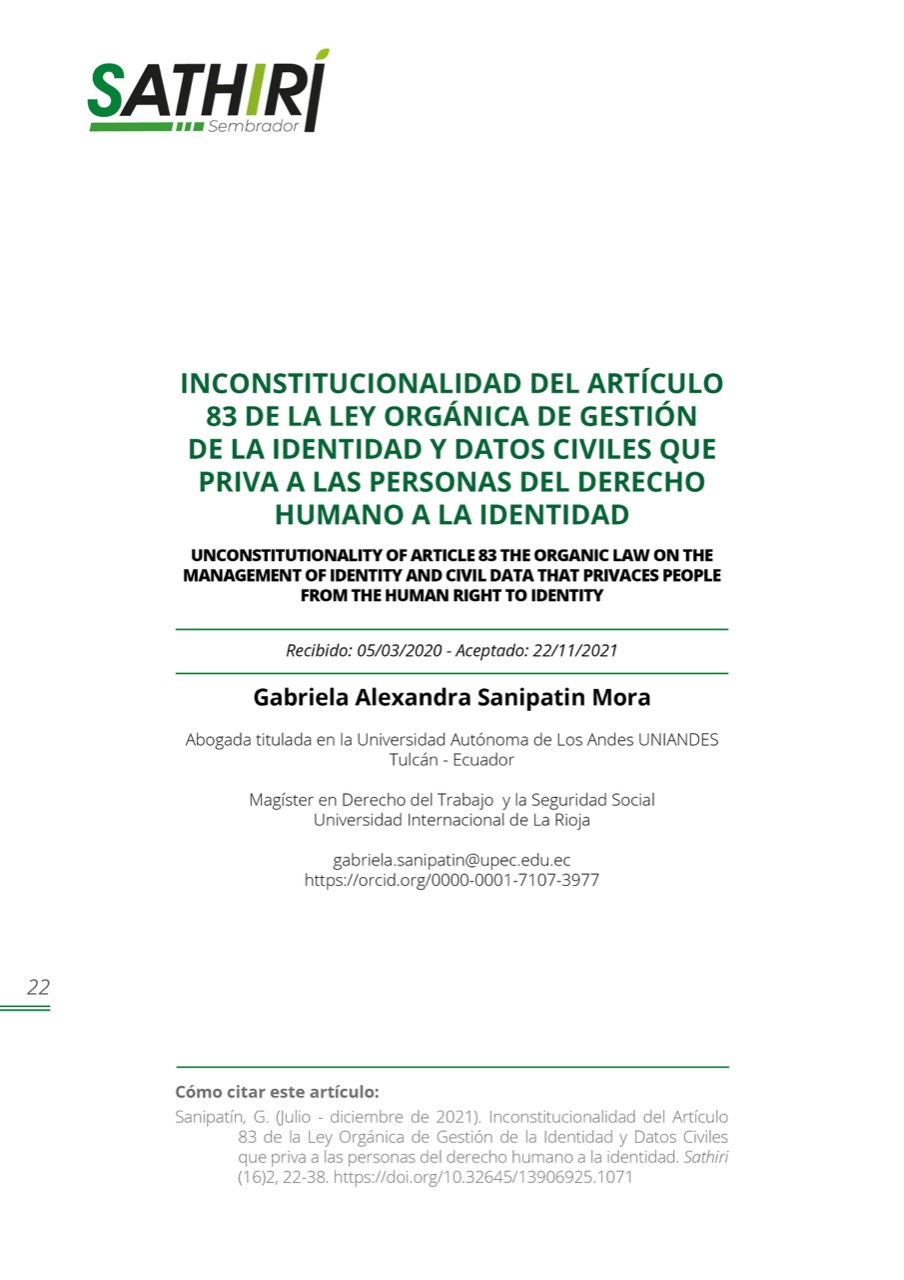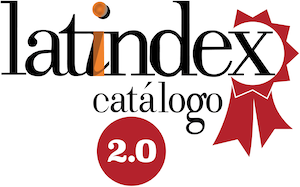Unconstitutionality of article 83 the organic law on the management of identity and civil data that privaces people from the human right to identity
DOI:
https://doi.org/10.32645/13906925.1071Keywords:
human right to identity, constitutional supremacy, normative hierarchy, pro persona principle, principle of direct applicability, lack of motivationAbstract
The authorities, servants and public servants of the Civil Registry and Identification Service of Ecuador, are empowered by Art., 83 of the Organic Law of Identity and Civil Data Management, in the case of a double or multiple registration of the same act or fact of the civil status of people, despite the fact that they contain different data, in order to cancel subsequent registrations. But these annulments have also led the annulment of the human right to identity, a situation which contravenes the international human rights instruments that enshrine it, as the Universal Declaration of Human Rights and the Convention on Human Rights, both of the Organization. of the United Nations, as well as the Constitution of the Republic and the Childhood and Adolescence Code. 66 of the aforementioned constitutional body provides that the right to personal identity includes preserving, developing and strengthening the material and immaterial characteristics of identity, including nationality and family origin. Which, when birth registration is annulled, disappear administratively, which is unconstitutional because there is a conflict between norms of higher and lower hierarchy, which the Constitution of the Republic itself resolves in paragraph 2° of its Art.
References
Abuelas de Plaza de Mayo. (27 de Diciembre de 2017). http://www.ambito.com/907702-abuelas-de-plaza-de-mayo-anunio-la-recuperacion-de-la-nieta-127. Obtenido de http://www.ambito.com/907702-abuelas-de-plaza-de-mayo-anunio-la-recuperacion-de-la-nieta-127: http://www.ambito.com
Aguilar Llanos, B. (2013). El interés superior del niño en la solución de controversias sobre la cancelacioón de partida. Revista de Jurisprudencia Institucional del RENIEC, Año VII, N° 6.
Casares Garcia, L. (2017). Noción básica del derecho a la identidad en México. México D.F.: Instituto de Investigaciones Jurídicas UNAM.
Código de la Niñez y Adolescencia. (2003). Quito: Corporaciónj de Estudios y Publicaciones, edición 2021.
Constitución de la República del Ecuador. (2008). Quito: Corporación de Estudios y Publicaciones, Edición 2021.
Corte Constitucional del Ecuador. (2020). Sentencia N° 1000 - 17 - EP/20. Quito: Corte Constitucional del Ecuador.
García Falconí, J. (22 de Noviembre de 2010). https://www.derechoecuador.com/el-derecho-constitucional-a-la-identidad. Obtenido de https://www.derechoecuador.com/el-derecho-constitu-cional-a-la-identidad: https://www.derechoecuador.com
Henríquez Viñas, M. (2013). artículo Los jueces y la resolución de antinomias desde la perspectiva de las fuentes del Derecho Constitucional Chileno. Revista de Estudios Constitucionales, 459 - 476.
Ley Orgánica de Gestión de la Identidad y Datos Civiles. (2016). Quito: Registro Oficial Suplemento 684 de 04-feb.-2016.
Ministerio de Educación de la República Argentina. (2015). Clase N° 3/2015 sobre Derechos Humanos. Buenos Aires: Ministerio de Educación de la República Argentina.
Moreno, R. (2001). Diccionario de Ciencias Penales. Buenos Aires, Argentina: Ad hoc.
Organización de Naciones Unidas . (1989). Convención Internacional de Derechos del Niño. Ginebra: UNICEF Comité Español.
Organización de Naciones Unidas. (1948). Declaración Universal de Derechos Humanos. París, Francia: Organización de Naciones Unidas.
Otero, P. (1999). Ser Humano: um perfil constitucional da bioética, Coimbra: Almedina,. Coimbra: Almedina.
Registro Nacional de Identificación y Estado Civil del Perú. (2007). El derecho a la identidad: el derecho al nombre, Capítulo VIII, Primera Edición. LIma, Perú: Registro Nacional de Identificación y Estado Civil del Perú.
Senado de los Estados Unidos Mexicanos. (2017). Proyecto por el que se reforman los artículos 58 y 389 del Código Civil Federal. México D.F.: Senado de los Estados Unidos Mexicanos.

Downloads
Published
Issue
Section
License
Copyright (c) 2021 Gabriela Alexandra Sanipatin Mora

This work is licensed under a Creative Commons Attribution-NonCommercial-NoDerivatives 4.0 International License.
El autor mantiene los derechos morales e intelectuales de su obra, autorizando a la editorial de la revista Sathiri la difusión y divulgación de su contenido con fines estrictamente académicos y de investigación, sin fines de lucro. Así mismo, se autoriza que la obra sea descargada y compartida con otras personas, siempre y cuando no sea alterada y se reconozca su autoria.




















